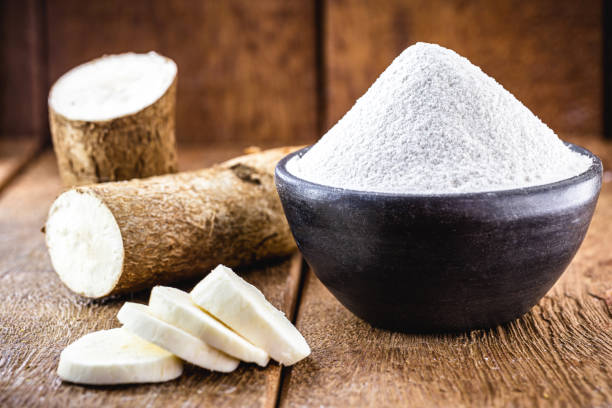Cassava (Manihot spp) is a tropical perennial crop cultivated mainly for its edible root, is a staple food consumed worldwide and provides much economic benefit to the producers. Cassava can be processed in a variety of ways to arrive at different products including as gari, fufu, lafun, starch, starch and pellets, etc.
Food processing sub-sector possesses has the greatest potential for growth in Nigeria. Growth rate of more than 9% is envisaged looking at growing urbanization, population explosion and changing food consumption pattern among Nigerians for natural foods and products. This has inevitably increased daily consumption of cassava and its derivatives.
Starch is one of the most abundant substances in nature, a renewable and almost unlimited resource. Starch is produced from grain or root crops. It is mainly used as food, but is also readily converted chemically, physically, and biologically into many useful products to date, starch is used to produce such diverse products as food, paper, textiles, adhesives, beverages, confectionery, pharmaceuticals, and building materials. Cassava starch has many remarkable characteristics, including high paste viscosity, high paste clarity, and high freeze-thaw stability, which are advantageous to many industries
Cassava starch is produced primarily by the wet milling of fresh cassava roots but in some countries such as Thailand it is produced from dry cassava chips. Starch is the main constituent of cassava. About 25% starch may be obtained from mature, good quality tubers. About 60 % starch may be obtained from dry cassava chips and about 10 % dry pulp may be obtained per 100 kg of cassava roots.
The Nigerian starch market is witnessing a boom as a result of limited domestic supplies and smuggling activities exploiting the dual tariff system on imports of corn starch. The price of food grade native starch have peaked in the last four months from N90,000 to N100,000 per ton in the last (January 2006) month. Prices are likely to remain high in the coming months until new starch plants come into production towards the end of the year. An investment in the cassava starch industry is perhaps the most lucrative investment at this time in the protected Nigerian cassava agribusiness sector.
Food processing sub-sector possesses has the greatest potential for growth in Nigeria. Growth rate of more than 9% is envisaged looking at growing urbanization, population explosion and changing food consumption pattern among Nigerians for natural foods and products. This has inevitably increased daily consumption of cassava and its derivatives.
Starch is one of the most abundant substances in nature, a renewable and almost unlimited resource. Starch is produced from grain or root crops. It is mainly used as food, but is also readily converted chemically, physically, and biologically into many useful products to date, starch is used to produce such diverse products as food, paper, textiles, adhesives, beverages, confectionery, pharmaceuticals, and building materials. Cassava starch has many remarkable characteristics, including high paste viscosity, high paste clarity, and high freeze-thaw stability, which are advantageous to many industries
Cassava starch is produced primarily by the wet milling of fresh cassava roots but in some countries such as Thailand it is produced from dry cassava chips. Starch is the main constituent of cassava. About 25% starch may be obtained from mature, good quality tubers. About 60 % starch may be obtained from dry cassava chips and about 10 % dry pulp may be obtained per 100 kg of cassava roots.
The Nigerian starch market is witnessing a boom as a result of limited domestic supplies and smuggling activities exploiting the dual tariff system on imports of corn starch. The price of food grade native starch have peaked in the last four months from N90,000 to N100,000 per ton in the last (January 2006) month. Prices are likely to remain high in the coming months until new starch plants come into production towards the end of the year. An investment in the cassava starch industry is perhaps the most lucrative investment at this time in the protected Nigerian cassava agribusiness sector.
Executive Summary
Project Brief
o 2.1 Proposed Business Legal Status
Opportunity Rationale
Proposed Capacity
Break-Down Capital Expenses
Break-Down Working Capital
Project Cost
Markets
Production
o 9.1 Peeling and washing
o 9.2 Rasping or pulping
o 9.3 Screening
o 9.4 Settling and Purification of starch
o 9.5 Settling and granule size
o 9.6 Raw Materials
o 9.7 Machinery and Equipment
o 9.8 Production Programme
Manpower Requirement
Key Success Factors/Practical Tips for Success
• 11.1 Practical Tips
Crucial Factors & Steps in Decision Making for Investment
• 12.1 SWOT Analysis
Financial Analysis
• 13.1 Cash Flow Analysis
• 13.2 Repayment Schedule
• 13.3 Key Assumptions
Project Brief
o 2.1 Proposed Business Legal Status
Opportunity Rationale
Proposed Capacity
Break-Down Capital Expenses
Break-Down Working Capital
Project Cost
Markets
Production
o 9.1 Peeling and washing
o 9.2 Rasping or pulping
o 9.3 Screening
o 9.4 Settling and Purification of starch
o 9.5 Settling and granule size
o 9.6 Raw Materials
o 9.7 Machinery and Equipment
o 9.8 Production Programme
Manpower Requirement
Key Success Factors/Practical Tips for Success
• 11.1 Practical Tips
Crucial Factors & Steps in Decision Making for Investment
• 12.1 SWOT Analysis
Financial Analysis
• 13.1 Cash Flow Analysis
• 13.2 Repayment Schedule
• 13.3 Key Assumptions
$70 ( N100,000)
Get your conditional loan offer: admin@fundxperts.com
Contact: admin@fundxperts.com

